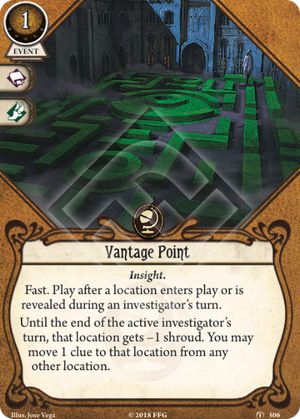Luke Robinson loves this card. In conjunction with his Gate Box/Dream-Gate, it functions essentially as a second version of Working a Hunch, except that it's one resource cheaper and can grab a clue from literally any revealed location.
이벤트
통찰.
비용: 1.
신속. 어느 조사자의 차례 동안, 장소 하나가 플레이 영역에 들어오거나 장소 하나가 공개된 후에 플레이할 수 있습니다.
활성 조사자의 차례가 끝날 때까지, 그 장소는 -1 장막값을 얻습니다. 당신은 아무 다른 장소에 있는 단서 1개를 그 장소로 이동시켜도 됩니다.

FAQs
No faqs yet for this card.
Reviews
Long range clue manipulation is the new game in town. The suite includes cards such as Connect the Dots and Intel Report and while it's still all dependent on incidental Jank, it actually works.
First, what characters?
- Ursula Downs with her ability to slam a location she just moved into with all 3 actions's worth of investigation can make full use of the shroud reduction.
- Roland Banks can use this to move clues with him to cheat up.
- "Ashcan" Pete can move a clue to ensure Duke picks up 2 at once.
- Rex Murphy can hoist around clues to round things out to even numbers, he can do it reactively to null out a failure to trigger his and try it again elsewhere or ensure that something like 2 different 3-clue locations turn into a 2 and 4 clue location respectively.
Regardless of character, you can skootch a clue off of a location that you don't want to return to or onto an easier spot, or elsewise you might use it to "finish" a location for XP or a scenario requirement. There is also one colossal moving force in the strength/weakness of Vantage Point, player count. Depending on your other card choices you may be so and so able to pick up clues in a count of 2's or 3's, this is where multi clue cards and cards like Intel Report and Connect the Dots come in.
In 2 player you can play Intel Report or Connect the Dots to clean up a location completely, in 3 player you might move the clue from a 3-clue location and get the other two as mentioned before (style points for using Vantage Point to enable playing Connect the Dots).
Make note of the precise text on Vantage Point, you can play the card when a location is revealed, but also when a location enters play, this little extra window of use might be helpful in certain scenarios.
All in all the card is not particularly strong, moving a clue is an ancillary benefit, barely worth a slot on most characters. A primary clue gatherer in a large party might consider it to enhance their ability to react to clues all over the map via Connect the Dots or an Ursula Downs or "Ashcan" Pete who can move the clue, use the shroud reduction and pick up the moved clue in a flurry of investigation.
I had a friend play this tonight when we were playing the second scenario of Forgotten Age, and he had a pretty clever use for it: he took the last clue off of a high shroud location (shroud 5) and put it on a slightly lower shroud location that had just been revealed (shroud 4). Why was this clever? Because the location we took the last clue from was worth a victory point.
Now, you can obviously use this card to lower the shroud of a location and make it easier to investigate for a turn, but I don't think that's terribly relevant. Why? Because, except for a few corner cases where people have extra actions, you are, at best, going to get two investigations with -1 shroud.
I think the best use of this card you are going to regularly get to use is taking clues from locations you don't want them and moving them somewhere else. And I don't just mean from high shroud locations. Some locations inflict a penalty for trying to move on to them or for trying to investigate on them. And I can think of three locations from that scenario alone that would fit the above description.
But the times you will be most proud of yourself will be the times when you spent one resource and net your team a victory point.
This card is like half a flashlight that is much less flexible ("during an investigator's turn" is the important part). The second effect may sometimes be useful but I don't think I'll ever include 2 copies of this unless I know that the scenario will be adding locations as I go (e.g. Forgotten Age).